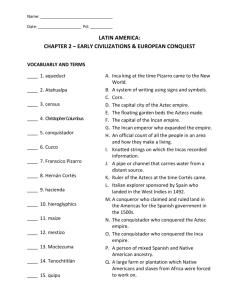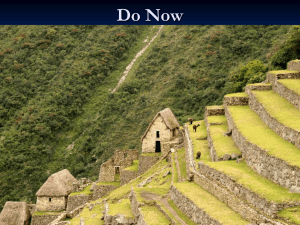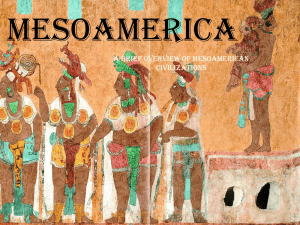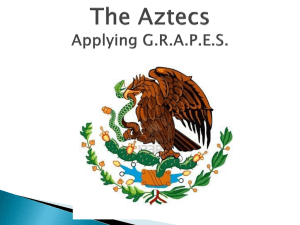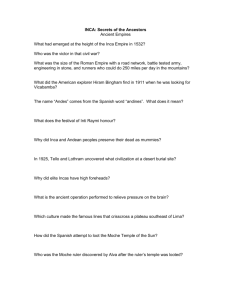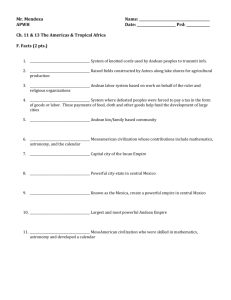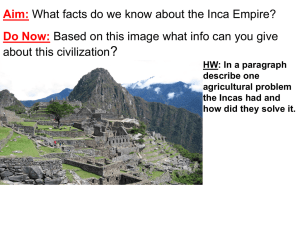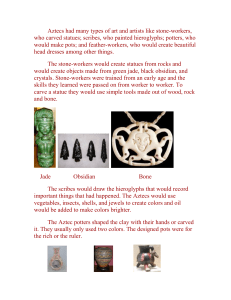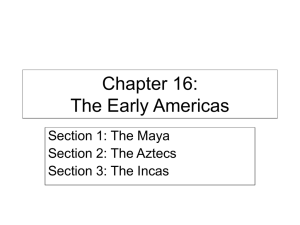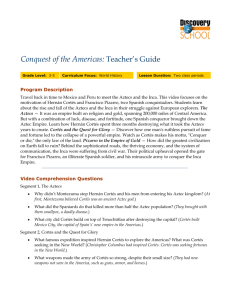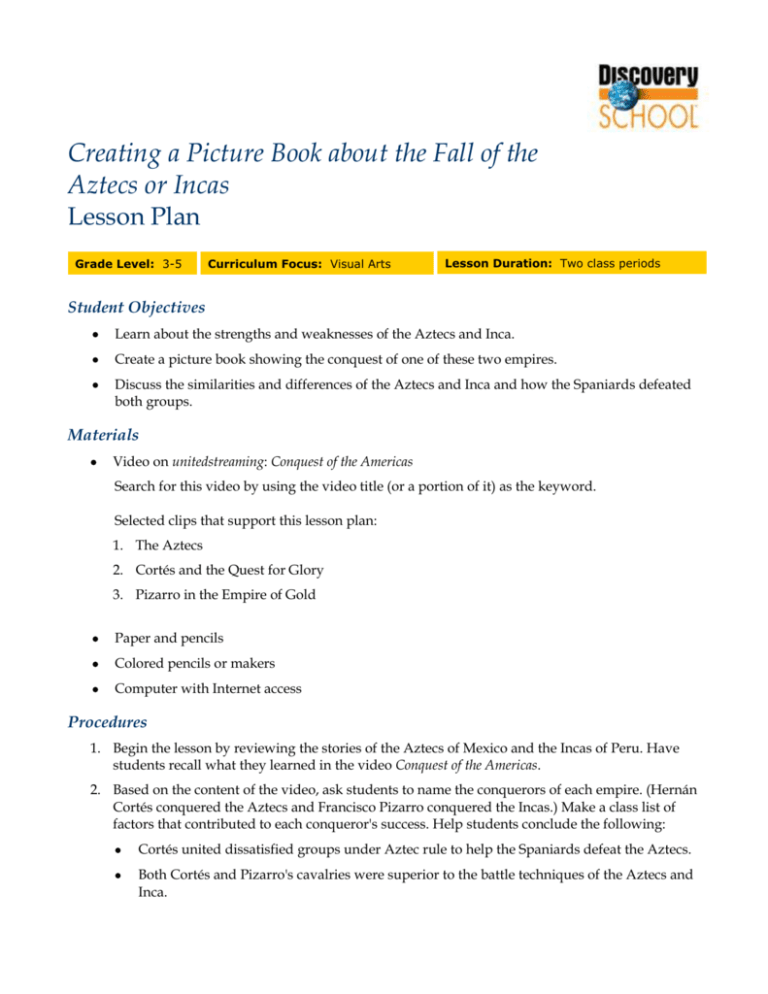
Creating a Picture Book about the Fall of the
Aztecs or Incas
Lesson Plan
Grade Level: 3-5
Curriculum Focus: Visual Arts
Lesson Duration: Two class periods
Student Objectives
Learn about the strengths and weaknesses of the Aztecs and Inca.
Create a picture book showing the conquest of one of these two empires.
Discuss the similarities and differences of the Aztecs and Inca and how the Spaniards defeated
both groups.
Materials
Video on unitedstreaming: Conquest of the Americas
Search for this video by using the video title (or a portion of it) as the keyword.
Selected clips that support this lesson plan:
1. The Aztecs
2. Cortés and the Quest for Glory
3. Pizarro in the Empire of Gold
Paper and pencils
Colored pencils or makers
Computer with Internet access
Procedures
1. Begin the lesson by reviewing the stories of the Aztecs of Mexico and the Incas of Peru. Have
students recall what they learned in the video Conquest of the Americas.
2. Based on the content of the video, ask students to name the conquerors of each empire. (Hernán
Cortés conquered the Aztecs and Francisco Pizarro conquered the Incas.) Make a class list of
factors that contributed to each conqueror's success. Help students conclude the following:
Cortés united dissatisfied groups under Aztec rule to help the Spaniards defeat the Aztecs.
Both Cortés and Pizarro's cavalries were superior to the battle techniques of the Aztecs and
Inca.
Creating a Picture Book about the Fall of the Aztecs or Incas
Lesson Plan
Smallpox and other European diseases contributed to diminishing the populations of the
Aztec and Inca Empires.
Much division within the Inca Empire worked to Pizarro's advantage.
2
3. After students have become familiar with the key elements of each story, divide them into pairs.
Have each pair choose to focus on the Aztecs or Inca. Try to have an equal number of students
working on each story. Tell the pairs to develop picture books explaining how their group was
conquered. The pairs should be sure to cover the following points:
Strengths of the Aztecs or Inca
Weaknesses of the Aztecs or Inca
Reasons for Spanish victories
4. Give students time in class to research their topics and complete their picture books. Then have
each pair present their books to the class. Additional information is found at the Web sites
below.
Hernán Cortés
http://www.umich.edu/~proflame/texts/mirror/conflict.html
http://www.mexconnect.com/mex_/history/jtuck/jtcortes.html
http://www.virtualology.com/virtualmuseumofhistory/hallofexplorers/HERNANDOCORTES.COM/
Francisco Pizarro
http://www.bruce.ruiz.net/PanamaHistory/francisco_pizarro.htm
http://www.ucalgary.ca/applied_history/tutor/eurvoya/inca.html
http://www.geocities.com/Athens/7012/bios/explorers/pizarro.htm
http://www.carpenoctem.tv/military/pizarro.html
5. Conclude the lesson by discussing differences and similarities between the Spaniards' treatment
of the Aztecs and Inca. In what ways were they similar? Which conquistador showed more
compassion? How did events beyond the Spaniards' control lead to their success?
6. Help students conclude that while Cortés showed somewhat more compassion for the Aztecs
than Pizarro did for the Inca, both greedy conquistadors were fighting to expand the Spanish
Empire. Their superior cavalries contributed to their success. The native groups were also
defeated by a smallpox epidemic, which killed thousands of people.
Assessment
Use the following three-point rubric to evaluate students' work during this lesson.
3 points: Students participate actively in class discussions; created highly attractive and
informative picture books based on research; and drew insightful conclusions based on the
lesson.
2 points: Students participated in class discussions; created attractive and somewhat
informative picture books based on some research, and drew some conclusions based on
the lesson.
Published by Discovery Education. © 2005. All rights reserved.
Creating a Picture Book about the Fall of the Aztecs or Incas
Lesson Plan
3
1 point: Students did not participate in class discussions; did not complete their picture
books; and had difficulty drawing conclusions based on the lesson.
Vocabulary
Aztecs
Definition: A Native American people who built an empire in Mexico that thrived during the
1400s and early 1500s
Context: Famine and disease contributed to the defeat of the Aztecs at the hands of the
Spaniards.
conquistador
Definition: The Spanish word for conqueror; the term refers to the first Europeans who entered a
region for the purpose of forcing the native peoples out and settling in the area.
Context: The conquistadors of Spain were famous for conquering New World empires and for
taking as much gold as they could.
Hernán Cortés
Definition: A Spanish conquistador who defeated the Aztecs in 1521
Context: Hernán Cortés forged an alliance among some Indian groups under Aztec control,
which helped him defeat this mighty empire.
Inca
Definition: A South American Indian people that established one of the largest and wealthiest
empires in the Americas. At its height, the empire extended more than 2,500 miles along the
western coast of South America.
Context: A key similarity between the Aztecs and Inca was a lack of unity among different
Indian groups that made up each empire.
Moctezuma
Definition: The Aztec emperor from 1502 to 1519
Context: Moctezuma's mistakes dealing with Cortés contributed to his death and the fall of the
Aztec Empire.
Francisco Pizarro
Definition: The Spanish conquistador who vanquished the Inca Empire in 1534
Context: Francisco Pizarro was a fierce and ruthless leader, determined to defeat the Inca and
take over their empire.
Published by Discovery Education. © 2005. All rights reserved.
Creating a Picture Book about the Fall of the Aztecs or Incas
Lesson Plan
4
Academic Standards
Mid-continent Research for Education and Learning (McREL)
McREL's Content Knowledge: A Compendium of Standards and Benchmarks for K-12 Education
addresses 14 content areas. To view the standards and benchmarks, visit
http://www.mcrel.org/compendium/browse.asp.
This lesson plan addresses the following national standards:
World History—Understands the economic, political, and cultural interrelations among
peoples of Africa, Europe, and the Americas between 1500 and 1750.
Art Connections—Understands connections among the various art forms and other
disciplines.
The National Council for the Social Studies (NCSS)
The National Council for the Social Studies (NCSS) has developed national standards to provide
guidelines for teaching social studies. To view the standards online, go to
http://www.socialstudies.org/standards/strands/.
This lesson plan addresses the following thematic standards:
Culture
Time, Continuity, and Change
Individuals, Groups, and Institutions
Power, Authority, and Governance
Support Materials
Develop custom worksheets, educational puzzles, online quizzes, and more with the free teaching tools
offered on the Discoveryschool.com Web site. Create and print support materials, or save them to a
Custom Classroom account for future use. To learn more, visit
http://school.discovery.com/teachingtools/teachingtools.html
Published by Discovery Education. © 2005. All rights reserved.

